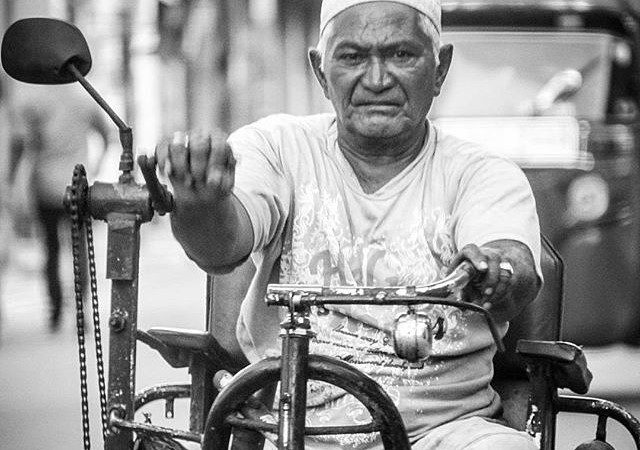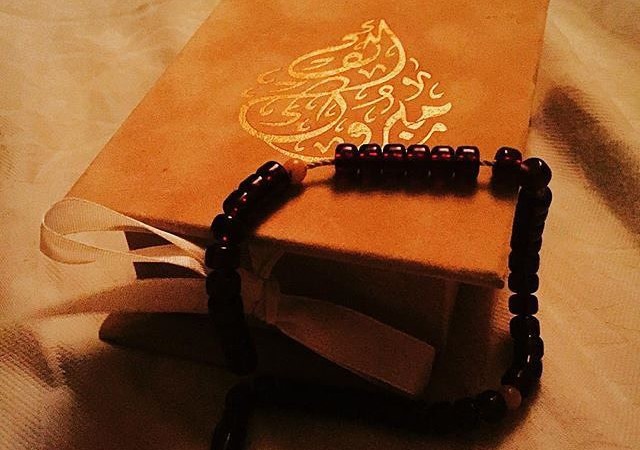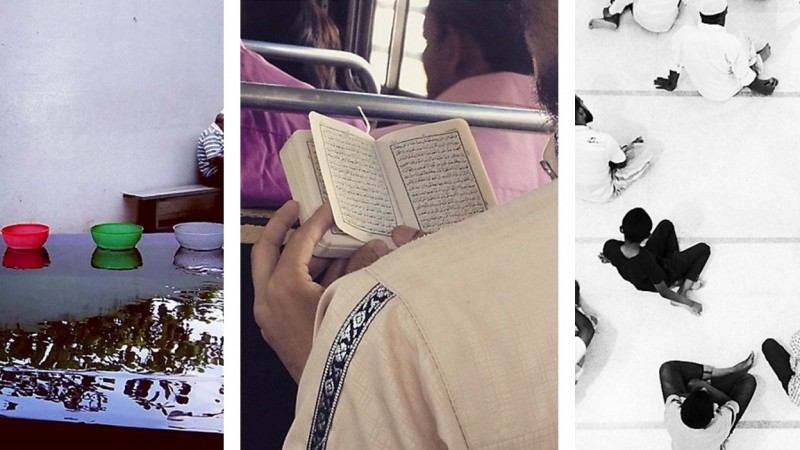This post originally appeared at Groundviews, an award-winning citizen journalism website in Sri Lanka. A redacted version is published below as part of a content-sharing agreement.
With the sighting of the crescent moon on the evening of June 6, Ramadan has officially begun in Sri Lanka. A month of huge significance to Muslims, the most tangible aspect of Ramadan, to the uninitiated, is the daily fast from dawn to sunset. However, Ramadan is about more than just abstaining from food and drink. Groundviews spoke to some people about the perceptions and beliefs around Ramadan, and its personal significance to Muslims.

“To me, Ramadan represents a time for the renewal of relationships.” Image by @mufarris via The Ramadan Project.
“You renew your relationship with yourself, by developing discipline in timekeeping, eating, and sleeping, while staying focused,” said Amjad Mohamed-Saleem, a visiting fellow at the Institute of Advanced Islamic Studies in Malaysia.
Apart from self-rejuvenation, Ramadan also renews a Muslim’s relationship with God, particularly through the daily fast. However, this month is also a time for family and friends; “This is the time you break fast together or go to the mosque,” and reconnect with the community. “Through extra night prayers in the mosque, you engage with the rest of the community in a way you wouldn’t during any other time.” Beyond this, it’s also about renewing relationships with society. “You understand the trials and tribulations of the needy; you pray for those that are being oppressed; and you share your fast with your neighbors.”

“You learn to be more compassionate so that you treat people as you wish to be treated.” Image by @nazlyahmed via The Ramadan Project
These aspects are often mysteries to the uninitiated—in fact, non-Muslims often perceive Ramadan to be a “dead month.” “No one really knows what happens,” Saleem explained. Hence the Ramadan Project, which Saleem co-curates. The Ramadan Project (see its Facebook page here) aims to humanize Ramadan and help people understand the festival and the unique tests Muslims endure during this month.
“Ramadan to me is a time to reflect and become closer to God. It's an opportunity to retell the narratives of my realities in a spiritually charged setting, reinforcing and strengthening my goals and purpose. Basically, [it's] like a spiritual bootcamp,” consultant Abdul-Halik Azeez (@colombedouin) said.
Photographer Aamina Nizam (@aaminanizar) said, “This month signifies making peace with myself and others, seeking knowledge, spending time with family, and building my spirit. The time we spend in contemplation and prayer is a reminder that there is more to life than just food, work, money and fame.”

“I look forward to Ramadan because it takes me on a spiritual retreat that keeps me grounded to what is important in life.” Image by By @amjadms via The Ramadan Project
The month of Ramadan is about harnessing willpower and cultivating patience, says Dr. Mareena Thaha Reffai, the founding president of Al Muslimaat, a women’s education initiative founded in 1990. “It is, in essence, like a one-month workshop on how to be a good Muslim. During this month, you try to recognize and stay away from every possible sin. In addition, you practice tawbah (seeking forgiveness). We do these things to increase piety. During these times, we believe that it’s easier to do good, and the reward in doing good deeds is multiplied,” Dr. Reffai said.
Muslims also often use this time to practice zakat (a form of almsgiving and religious taxation), donating their extra savings to the less fortunate, to ensure that they, too, will be able to practice their faith. The month of Ramadan also helps build a feeling of unity among the Muslim community.
Medical pre-intern Hasna Nivas said Ramadan is a special time, as every single prayer is multiplied seventy fold in its rewards, particularly during Laylatul qadr (the Night of Decree), which marks the date the Quran was revealed. “This lunar month is not just about fasting long hours and stuffing ourselves at the end of the day. And it's definitely not just about the Eid days of celebration that follow… it’s about how we can actually [empathize] with a poor hungry kid or a starving animal. How every day opens to an arena of opportunities, not only to get close to Allah but to do much more that we might be oblivious on a regular day.”
To Mohamed Hisham, the director of the Halal accreditation council and a steering committee member of the Muslim Council of Sri Lanka, Ramadan is not just about fasting or even self-reflection and improvement, but also about cementing the long-standing bond between Muslims and non-Muslims, “from sharing the snacks and Kanji (porridge) during the time of breaking the fast to sharing of Biriyani and Watalappan at the end of the month of Ramadan.” This goes both ways, Hisham notes, as non-Muslims often extend goodwill to the Muslim community during fasting, whether at workplaces, universities, or public institutions.
This spirit of camaraderie is particularly important this year, in the aftermath of floods and landslides across the country. “We have seen there were numerous examples of Muslim communities working together with fellow Buddhist, Hindu, and Christian citizens to help each other (especially in the aftermath of the floods and landslides),” Hisham said. This extended even to members of the clergy, who came together to call for unity in flood relief efforts. See this video uploaded to YouTube by Noorhaliza MN Naufer:
The sighting of the new moon was marked on social media, with everyone from world leaders to cartoon characters extending Ramadan greetings to Muslims.
Happy #Ramadan to my Muslim brothers, I hope you all have a blessed month. #lka #SriLanka
— Prabhath Gunarathna (@iam_PSG) June 6, 2016
Although Sri Lanka has grappled with divisions along ethnic and religious lines, in challenging times citizens do come together to help each other, casting aside their differences in exchange for a spirit of unity and togetherness.











1 comment